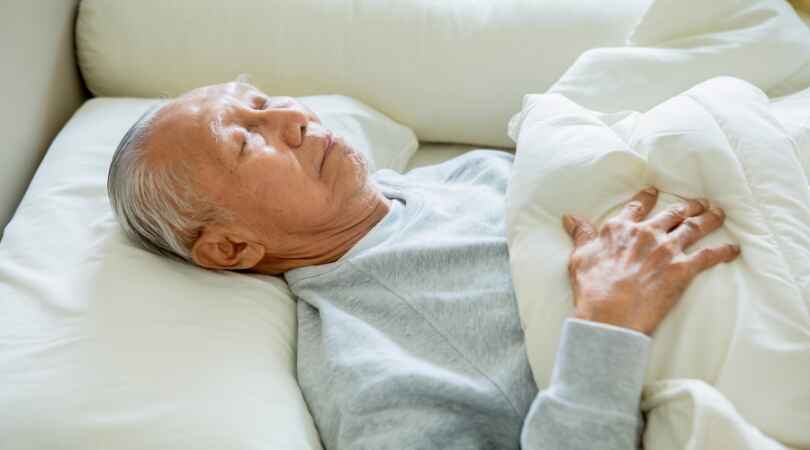Is my loved one starving or being dehydrated to death?
Published on December 11, 2021
Updated on August 18, 2025
Published on December 11, 2021
Updated on August 18, 2025

Table of Contents

When someone we love is extremely sick and close to dying, we may worry about them. We may wonder if they are hungry or thirsty. We may want to feed them and give them water. But sometimes, that is not what they need or want. In this article, I will explain why your loved one is not starving or dehydrated to death and how you can help them feel comfortable and loved.
I spoke with a doctor named Eric Barr in March 2021, who works with terminally ill patients. He told me that when people are dying, their brain tells them to eat and drink less. This is normal and natural. It means that their body is getting ready to die.
Many people believe that giving food and water to someone who is sick is a way of showing love and care. When I was a kid, my grandma made soup and sandwiches for me when I was ill. I have seen other people do the same thing for their loved ones. It is exceedingly kind and sweet.
But when someone is dying, it is different. They may not want to eat or drink anything at all. They may say no, turn their head away, or show signs that they are not hungry. We should respect their wishes and not force them to eat or drink against their will. Trying to make them eat or drink when they are sleeping or not fully awake can be very detrimental to them. It can make them choke, have trouble breathing, or have pain in their body.
When someone dies, their body no longer requires as much energy as it did before. It focuses on keeping its brain, heart, lungs, and kidneys working. Giving them too much food or water can cause their body to work harder than necessary. It can also cause their lungs to fill with water or their legs to swell. This can make them feel worse and die sooner.
Your loved one is not suffering from hunger or thirst. They are going through a natural process of dying. The best thing you can do for them is to be with them, talk to them, hug them, and tell them you love them. You can also get help from people who care for individuals with terminal illnesses, such as hospice or palliative care. They can make your loved one feel more comfortable and peaceful. They can also support you and your family during this challenging time.
Changes in the last hours and days of life
How Many Calories Does Digestion Use Up?
Teaching the Family What to Expect When the Patient is Dying
When someone you love stops eating and drinking
Why It’s OK for Your Loved One to Stop Eating and Drinking on Hospice
Articles on Advance Directives
CaringInfo – Caregiver support and much more!
The Hospice Care Plan (guide) and The Hospice Care Plan (video series)
Surviving Caregiving with Dignity, Love, and Kindness
Caregivers.com | Simplifying the Search for In-Home Care
Geri-Gadgets – Washable, sensory tools that calm, focus, and connect—at any age, in any setting
Healing Through Grief and Loss: A Christian Journey of Integration and Recovery
📚 This site uses Amazon Associate links, which means I earn a small commission when you purchase books or products through these links—at no extra cost to you. These earnings help me keep this website running and free from advertisements, so I can continue providing helpful articles and resources at no charge.
💝 If you don’t see anything you need today but still want to support this work, you can buy me a cup of coffee or tea. Every bit of support helps me continue writing and sharing resources for families during difficult times. 💙
VSED Support: What Friends and Family Need to Know
Take Back Your Life: A Caregiver’s Guide to Finding Freedom in the Midst of Overwhelm
The Conscious Caregiver: A Mindful Approach to Caring for Your Loved One Without Losing Yourself
Everything Happens for a Reason: And Other Lies I’ve Loved
Final Gifts: Understanding the Special Awareness, Needs, and Communications of the Dying
Between Life and Death: A Gospel-Centered Guide to End-of-Life Medical Care
Providing Comfort During the Last Days of Life with Barbara Karnes RN (YouTube Video)
Preparing the patient, family, and caregivers for a “Good Death.”
Velocity of Changes in Condition as an Indicator of Approaching Death (often helpful to answer how soon? or when?)
The Dying Process and the End of Life
Gone from My Sight: The Dying Experience
The Eleventh Hour: A Caring Guideline for the Hours to Minutes Before Death
By Your Side, A Guide for Caring for the Dying at Home
Bridges to Eternity: The Compassionate Death Doula Path book series:
Additional Books for End-of-Life Doulas
VSED Support: What Friends and Family Need to Know
Find an End-of-Life Doula
At present, no official organization oversees end-of-life doulas (EOLDs). Remember that some EOLDs listed in directories may no longer be practicing, so it’s important to verify their current status.
End-of-Life Doula Schools
The following are end-of-life (aka death doula) schools for those interested in becoming an end-of-life doula:
Remember that there is currently no official accrediting body for end-of-life doula programs. Certification only means one graduated from a program. It’s advisable to conduct discovery sessions with any doula school you’re considering—whether or not it’s listed here—to verify that it meets your needs. Also, ask questions and contact references, such as former students, to assess whether the school offered a solid foundation for launching your own death doula practice.